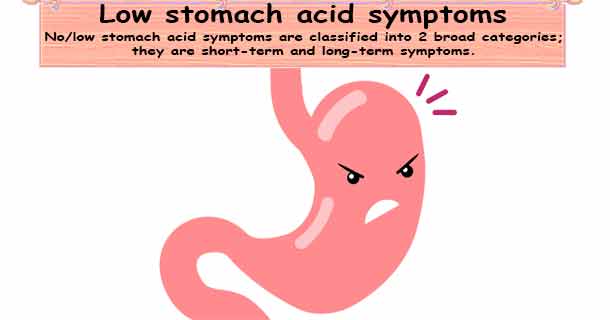No or low stomach acid symptoms are classified into two broad categories; they are short-term and long-term symptoms. The beginning symptoms of low acid indigestion are considering as short term symptoms. When not treated in time, then it can lead to some severe long-term symptoms.
Signs of low stomach acid
- You feel uncomfortable after eating meat - because people with low stomach acid do not have the ability to digest it. You need strong stomach acid to break down the protein and absorption.
- Frequent reflux after eating - insufficient stomach acid increases intra-abdominal pressure (IAP); this puts pressure on the lower esophageal sphincter (LES) to open. Even a microscopic quantity of stomach acid entering into the esophagus can make a huge pain and burning, because the esophagus has not protected against acid as stomach.
- Burp, fart or bloated after diet - with unpleasant taste and smell in your mouth. This is due to low stomach acid in your stomach does not kill the bacteria ingested along with the food. It starts fermenting the food causing foul taste and smell. Additionally, pyloric sphincter (opening valve between stomach and small intestine) will not open until your stomach acid level reaches a certain range thus it takes long for the stomach to emptying its content. This makes you experiencing bloating after eating that lost longer.
Short-term low stomach acid symptoms
Some of the most common symptoms, which develop within a short period in hypochlorhydria or achlorhydria, are:
- Bloating, belching, and flatulence – may occur due to excess gas due to fermentation of food instead of digesting it.
- Bad breath is noticeably unpleasant odors during exhaling.
- Diarrhea, or constipation – may occur because of low acid indigestion.
- Undigested food in stool may occur.
- Rectal itching may be due to undigested food, which is a favorable environment for the undesirable microbes to grow.
- Allergies to various foods, particularly protein foods – are because of low acid indigestion.
- Heartburn or GERD (Gastro Esophageal Reflux Disease) - often thought to cause by too much of stomach acid. However, low stomach acid also has this symptom because of improper closing of the lower esophageal sphincter causing acid reflux.
- Dilated blood vessels in the nose can cause non-allergic rhinitis with nasal congestion, specifically after eating and lying down.
- Feeling hungry all the time is due to improper digestion and absorption of nutrients.
Long-term low stomach acid symptoms
Some of the most common symptoms, which develop if not treated in time may produce certain long-term symptoms of hypochlorhydria or achlorhydria, are:
- Faster aging - due to mal-absorption, there is an apparent sudden aging.
- Skin problems such as acne can occur frequently or chronic.\
- Allergic reactions - are more common because poorly digested food has large antigenic interesting molecules enter the gut, where your immune system reacts against it causing allergy. Chronic fatigue is due to insufficient absorption of essential nutrients.
- Weak, cracked or damaged nails are due to improper absorption of calcium and other needed minerals.
- Osteoporosis – can lead to hip fracture.
- Hair fall or loss, and dry skin are due to improper digestion and absorption of essential nutrients.
- Anemia – may develop due to improper absorption of iron for the extended period due to low acid.
- Vitamin B12 deficiency – is because of insufficient absorption due to shortage of gastric acid. Which limits or stops its absorption, in due course leads to its deficiency. Vitamin b12 deficiency symptoms are fatigue, anxiety and depression.
- Increased risk for infection – is due to depletion of natural flora in the gut causing candida dysbiosis or bacterial dysbiosis.
- Increased risk towards autoimmune diseases such as rheumatoid arthritis and lupus.
- Anxiety disorder and depression may develop due to improper digestion (solar plexus imbalance) and lack of vital nutrient to nourish your brain.

